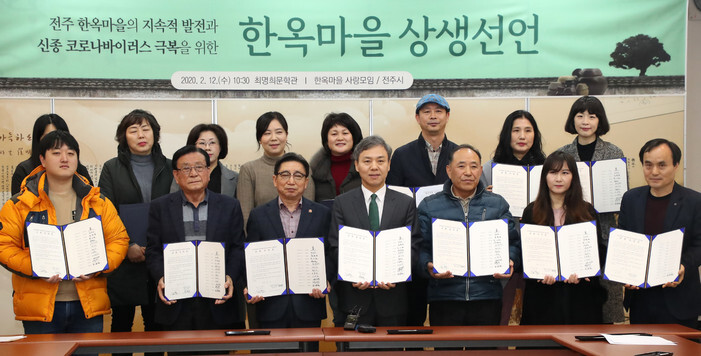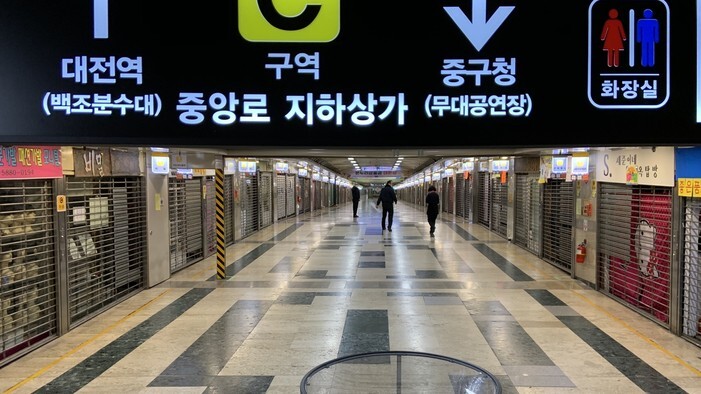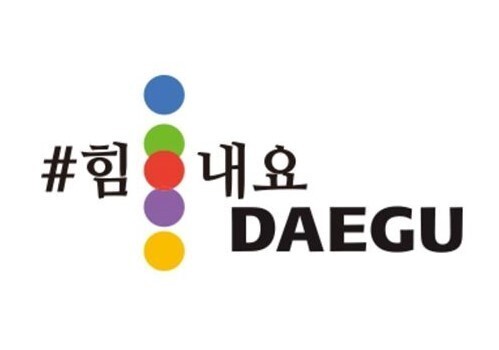hankyoreh
Links to other country sites 다른 나라 사이트 링크
“Nice landlord” movement gains traction in S. Korea

With small business owners under huge pressure because of the outbreak of the novel coronavirus, building owners are joining a “nice landlord” movement that’s gaining traction around the country. The government and the ruling party are looking into a plan that would assist these “nice landlords,” while banks are also looking to help out by lowering rent on the buildings they own and providing financial incentives to owners who do the same. There has also been a nationwide outpouring of support for Daegu and North Gyeongsang Province, the regions in a desperate fight against COVID-19, the disease caused by the coronavirus.
The prolongation of the COVID-19 outbreak is causing grave difficulties for small business owners, prompting business owners to lend a helping hand. On Feb. 25, the building owners of 4,000 of the 12,000 total shops in Seoul’s Namdaemun Market agreed to slash rent by 20% for the next three months to help small business owners who are struggling because of the outbreak. On the same day, 25 building owners in 1913 Songjeong Station Market, in the Gwangsan District of Gwangju, lowered their rents by 10-25%, while some of the building owners on Jeonpo Café Street, one of Busan’s best-known coffeehouse districts, reduced rent by 20-60%. Some building owners in Daegu’s Seomun Market agreed to lower rents or waive them altogether while shops are taking time off. Baek Yeong-cheol, 64, who runs a restaurant at the Sokcho Tourist and Fishery Market in Gangwon Province, said he would lower rent at six outlets he owns in the market by half until the COVID-19 outbreak is over.

Triple Street, a shopping mall in Songdo, Incheon, is planning to cut rent by 20% for two months in order to reduce the burden on its tenants (there are about 150 shops in the mall). Daejeon is discussing the option of suspending rent for small business owners at Jungang Street Underground Market and other publicly managed facilities.
Building owners in Jeonju Hanok Village have already joined the movement to lower rent. Fourteen of the owners who are committed to helping their tenants thrive declared on Feb. 12 that they will lower rent by at least 10% for at least 3 months. That prompted some 110 building owners in the Jeonju Traditional Market and the old downtown to sign on to the declaration. As of Feb. 25, the government has identified 166 building owners around the country who have joined the “nice landlord” movement, benefiting 2,828 shops.
The financial sector is also hopping on the bandwagon. On Tuesday, Shinhan Bank announced that it would be reducing rent by 30% (up to 1 million won, or US$822.94) for three months for small business owners and small and medium-sized enterprises that are tenants at buildings it owns around the country.
On Feb. 23, the Industrial Bank of Korea (IBK) announced that it would reduce rent at buildings it owns by 30% (up to 1 million won a month) for three months, starting in March. Woori Bank announced on Feb. 24 that it would offer special benefits on loan interest rates and fees for building owners who are part of the movement
The reason that building owners have taken the initiative to lower rent is because small business owners are in a serious bind. The Bank of Korea’s prospective household income index, an indicator of economic sentiment of the self-employed, stands at 87 for this month, a drop of 8 points compared to the previous month. That’s the lowest figure since March 2009 (79), in the middle of the global financial crisis.
The government and ruling party are also drawing up support measures. “We’re exploring a variety of support measures that can encourage more [landlords] to go easy on rent. In particular, I’m told that a plan is being developed to partially compensate the losses of landlords who voluntarily lower their rent,” said an official at the Blue House. Other potential ideas for compensating landlords include tax breaks (such as tax credits, income deductions, and a temporary reduction in property tax) and providing gift certificates and local currency.

Along with the “nice landlord” movement, messages of support are pouring out for Daegu and North Gyeongsang Province, bringing some relief to the sense of dread that’s settled over the country. In recent days, a steady stream of messages with the hashtags #CheerUpDaegu and #CheerUpDaegu&NorthGyeongsangProvince are trending social media. Encouraging comments have also been posted on Daegu’s official social media account. Along with message bearing the hashtag #CheerUpDaegu, one person wrote, “Get out of here, COVID-19!” Another said, “I hope that city employees are staying well-fed and taking adequate breaks. Stay strong for the people of Daegu.”
Others have been helping out in more tangible ways. Gangwon Province and the cities of Ulsan and Suwon have donated money and masks to Daegu, while Jeju Island is planning to donate 800 boxes (2.4 tons) of its “hallabong” citrus fruit and 80,000 500ml bottles of Samdasu, a local brand of bottled water. Financial contributions and medical supplies have been pouring in from some of Daegu’s leading companies, such as Kumbokju, Daegu Bank, and Jangbogo Grocery Store; religious groups, including the Presbyterian Church of Korea; and NGOs, including the Citizens’ Coalition for Achieving Safe Lives in Daegu. Donations have also been made by actors Lee Young-ae, Park Seo-joon, and Yoon Se-ah and by TV personality Jang Sung-kyu.
By Kim Yong-hee, Gwangju correspondent, Kim Il-woo, Daegu correspondent, Huh Ho-joon, Jeju correspondent, Han Gwang-deok, finance correspondent, and Park Hyun and Seong Yeon-cheol, staff reporters
Please direct comments or questions to [english@hani.co.kr]

Editorial・opinion
![[Column] Park Geun-hye déjà vu in Yoon Suk-yeol [Column] Park Geun-hye déjà vu in Yoon Suk-yeol](https://flexible.img.hani.co.kr/flexible/normal/500/300/imgdb/original/2024/0424/651713945113788.jpg) [Column] Park Geun-hye déjà vu in Yoon Suk-yeol
[Column] Park Geun-hye déjà vu in Yoon Suk-yeol![[Editorial] New weight of N. Korea’s nuclear threats makes dialogue all the more urgent [Editorial] New weight of N. Korea’s nuclear threats makes dialogue all the more urgent](https://flexible.img.hani.co.kr/flexible/normal/500/300/imgdb/original/2024/0424/7317139454662664.jpg) [Editorial] New weight of N. Korea’s nuclear threats makes dialogue all the more urgent
[Editorial] New weight of N. Korea’s nuclear threats makes dialogue all the more urgent- [Guest essay] The real reason Korea’s new right wants to dub Rhee a founding father
- [Column] ‘Choson’: Is it time we start referring to N. Korea in its own terms?
- [Editorial] Japan’s rewriting of history with Korea has gone too far
- [Column] The president’s questionable capacity for dialogue
- [Column] Are chaebol firms just pizza pies for families to divvy up as they please?
- [Column] Has Korea, too, crossed the Rubicon on China?
- [Correspondent’s column] In Japan’s alliance with US, echoes of its past alliances with UK
- [Editorial] Does Yoon think the Korean public is wrong?
Most viewed articles
- 1‘We must say no’: Seoul defense chief on Korean, USFK involvement in hypothetical Taiwan crisis
- 2N. Korean delegation’s trip to Iran shows how Pyongyang is leveraging ties with Moscow
- 3‘Weddingflation’ breaks the bank for Korean couples-to-be
- 4[Reportage] On US campuses, student risk arrest as they call for divestment from Israel
- 5Amnesty notes ‘erosion’ of freedom of expression in Korea in annual human rights report
- 6[Column] Park Geun-hye déjà vu in Yoon Suk-yeol
- 7Korea sees more deaths than births for 52nd consecutive month in February
- 8[Editorial] New weight of N. Korea’s nuclear threats makes dialogue all the more urgent
- 9Will NewJeans end up collateral damage in internal feud at K-pop juggernaut Hybe?
- 10[Guest essay] The real reason Korea’s new right wants to dub Rhee a founding father